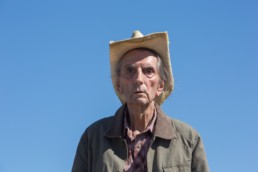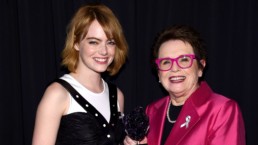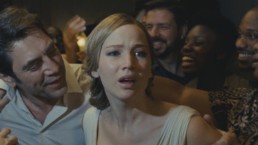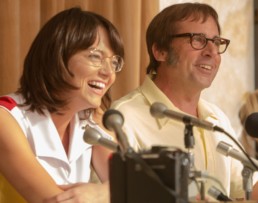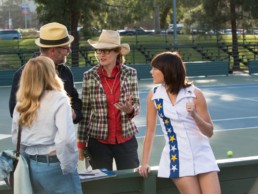'Una' Review: Sexual Abuse Victim Won't Let Go of Fantasy Life With Abuser
In the midst of uncovering one of Hollywood's most shocking and disgusting allegations of sexual abuse by movie honcho (and ex-co-chairman of The Weinstein Company) Harvey Weinstein, the oppressed voices of women at the hands of older, powerful men are being heard louder than ever.
These current events serve as a timely and fitting backdrop for Benedict Andrews' feature film debut, Una, which centers around one woman's mission to confront the man who sexually abused her as a child. Adapted from David Harrower's Tony award-winning play 'Blackbird,' Una opens at the ArcLight Hollywood and the Landmark Regent this Friday.
It's clear from the beginning that something is not right with 27-year-old Una (Rooney Mara). When we are introduced to her, she has just gotten back from a night out at a club where she had engaged in casual sex (her attitude leads us to believe this isn't the first time). Withdrawn from her family, she seems distracted by her own thoughts. One day, on a whim, Una picks up and drives away. She finally arrives at a nondescript workplace hours from her home. Her emotions begin to cause her physical discomfort, she stops to throw up near the building's shrubbery. She finally walks into the building. She sees him, Ray (Ben Mendelsohn) – the man who molested her when she was 13-years-old.
The confrontation is not a typical one. After serving four years in jail, Una has sought Ray out to continue the fantasy of what was 14 years prior. She loved him and, in a disturbed way, she still loves him. Flashbacks pinpoint moments when Una and Ray's relationship went from friendly to inappropriate, describing in graphic detail the sexual acts that occurred. But Ray has moved on with no interest in reliving the mistake that nearly cost him his life. Una, though, won't let him off the hook that easily.
Una's tragic flaw is the attempt to sympathize with an abuser while hinting that the abused may be mentally unstable or in some way troubled.
Rooney Mara brings a composed brooding element to 'Una' while keeping her doe-eyed childhood innocence intact. Mara takes on an emotional weight in this role and gives many dimensions to Una's backstory, especially her confusion of still loving her abuser. Ben Mendelsohn as the pedophile Ray lingers in the uncomfortableness of the situation he finds himself in with Una, perhaps in an effort to prove that he is not a total monster, just a man with a dirty past who may never be able to outrun the consequences of his lack of judgment. Riz Ahmed plays the role of Scott, an employee at the company who befriends Una after a particularly disturbing conversation with Ray. Ahmed is compassionate and generous, although that seems to be the extent of his character development.
Una is without a doubt a heavy film, pulling similar vibes from David Fincher's Gone Girl and Adrian Lyne's Lolita. It offers an unconventional perspective on sexual abuse from the eyes of the abused, however, I believe it could have championed women's causes in this situation more strongly. The hardest thing to understand, especially given current events, is why Ray isn't villainized more harshly. The physical and emotional scars he gave Una will never be forgotten, and the fact that he can move on so (seemingly) nonchalantly is extremely frustrating. It shouldn't matter whether or not Una still has "feelings" for Ray, that is not the crime here. The real crime is that she was taken advantage of as a child by a man who was old enough to be her father– who clearly knew right vs wrong, legal vs illegal– and that should never be written as anything other than purely disgusting. Una's tragic flaw is the attempt to sympathize with an abuser while hinting that the abused may be mentally unstable or in some way troubled. Adaptation or not, the story of Una is not the narrative we should be continuing to tell.
94 minutes. 'Una' is rated R for strong sexual content, nudity, and language. Opening this Friday at the Landmark Regent and ArcLight Hollywood.
'Lucky' Review: Harry Dean Stanton Smiles in the Face of Mortality in this Bittersweet Drama
On September 15th, the film industry lost one of its shining stars.
Harry Dean Stanton, best known for his roles in Paris, Texas and Alien, had passed away at the age of 91 said his agent John S. Kelly in a shocking announcement. The news shook everyone who admired the character actor's impressive repertoire and many talents (he was also a reputable musician and singer). His final starring role in a film, Lucky, is appropriately titled as we truly are lucky to see Stanton in a role as a man who, ironically, questions permanence and the mystery of death.
Stanton plays the role of Lucky, a retired Navy veteran, atheist, and all-around crabby senior citizen. He lives alone in an unspecified pioneer-like desert town, passing his days by sticking to a routine of light exercise, trying his hand at a crossword puzzle at the local diner, and watching game shows. Everyone in the town is on a first name basis with Lucky, whose cranky demeanor doesn't stop them from initiating conversations on how he should quit his pack-a-day smoking habit, or how his morning is going.
A health scare draws Lucky into an even more introspective state when he is forced to face his impending mortality. He is getting older, his gaunt face and fragile bones showing a life slowing down, but well-lived. His conversations with friends Paulie (James Darren), Elaine (Beth Grant), and Howard (David Lynch) become more philosophical. Lucky talks about the difference between being lonely and being alone. Paulie talks about his special relationship with Elaine. Howard imparts wisdom after the disappearance of his tortoise, President Roosevelt, "Think of the burden a tortoise carries on his back. Yes, [his shell] is for protection, but ultimately its the coffin he's going to get buried in. And he has to drag it around his entire life."
Meditative and self-reflective, "Lucky" is a touching posthumous tribute to Stanton.
Recent events seem to certainly have affected John Carroll Lynch's directorial debut; while it may be a bit morbid to admit, the death of Stanton makes the film feel even more special. It is such a poignant piece of work that embodies spiritualism and realism with great empathy. The cast, which includes Ron Livingston as Bobby Lawrence, is phenomenal. They might as well be directly talking to the audience when they give life advice to Lucky– sharing wisdom that offers a sense of security and trust.
The film may take place in a stuffy desert town, but the vibe is anything but suffocating. Actor turned director John Carroll Lynch gives the characters room to breathe with fluid dialogue and subtle movements that compliment the environment. There are things in this universe that are bigger than us, Lucky so calmly recites, and this film is a gentle reminder of this. Meditative and self-reflective, Lucky is a touching posthumous tribute to Stanton. In the film, he says he smiles at the impermanence of life. Wherever he is now, I hope he is still smiling.
'Lucky' is not rated. 88 minutes. Opend this Friday at The Landmark and the Laemmle Pasadena.
11 Secrets Billie Jean King, Sara Bareilles and More Share From 'Battle of the Sexes'
Now playing in select theaters, with a wide release scheduled for this Friday, "Battle of the Sexes" has certainly made its mark as a film of strength and courage.
In conjunction with the growing momentum of female empowerment, 21st Century Fox donated $0.79 for every ticket sold during the film's opening weekend to the Women's Sports Foundation. The sports biography details the infamous and legendary tennis match between Billie Jean King and Bobby Riggs. King, always a social activist, was determined to change the world views through tennis and it's clear how far reaching her impact has had on her peers, fellow athletes, and society as a whole. We talked to King, as well as Bill Pullman, Eric Christian Olsen, Sara Bareilles, Elisabeth Shue, and Nicholas Britell about their experience working on "Battle of the Sexes."
Billie Jean King considers this a blessing
Billie Jean King: To me, everything that happens is a blessing. Holly Hunter did the TV movie ["When Billie Beat Bobby"]... but I never thought [there would be] a movie movie! People would come to us about it over the years, but this one was perfect... I must tell you if we're talking sports terms, this cast is an amazing team. They're really good to each other and it's been an unbelievable experience.
 Billie Jean King and Bobby Riggs smile during a news conference in New York to publicize their upcoming match at the Houston Astrodome, July 11, 1973. (AP Photo)
Billie Jean King and Bobby Riggs smile during a news conference in New York to publicize their upcoming match at the Houston Astrodome, July 11, 1973. (AP Photo)
George Foreman bet on Billie Jean to beat Bobby
Billie Jean King: It was incredible [watching Sloane Stephens win the U.S. Open and $3.7 million]. And she's a woman of color. That's one of the things we were trying to do- did you notice in "Battle of the Sexes" how 'white' everything is? I think we had two people of color in the audience, Jim Brown, the NFL football player and Geroge Foreman, the great boxer. George bet on me and of course, I knew Jim would vote for Bobby. George actually ended up being a security guard, we had no security guards in those days.
An obituary humanized the friendly misogynist, Jack Kramer
Bill Pullman (Jack Kramer): He was such an institutional man. He has a book called The Game: My 40 Years in Tennis (Bobby has a book called Tennis is my Racket). He was the #1 player [in the sport], his obituary is full of great praise and how he lit up the room whenever he walked in.
The secret to Priscilla’s endless patience with Bobby
Elisabeth Shue (Priscilla Wheelan): Steve’s portrayal of Bobby was so human and ultimately so complicated and what I loved about him was his sheer desperation to be liked. Priscilla recognized how vulnerable he was and that allowed her to really love him and want to take care of him.

Steve Carell and Eric Christian Olsen in the film BATTLE OF THE SEXES. Photo by Melinda Sue Gordon. © 2017 Twentieth Century Fox Film Corporation All Rights Reserved
Playing a Bobby Riggs wingman requires short-shorts
Eric Christian Olsen (Lornie Kuhle): I get a lot of Instagram comments about the short shorts. That’s really going to help at the box office between Steve’s sideburns and my short shorts. Lornie Kuhle is a big part of the movie, he was there when we filmed a lot of the scenes. He’s 73 years old now, he’s amazing. I played him one day at lunch and he beat the crap out of me. I got like, 1 point out of him. He hustled me for $20. He’s a remarkable man and I wanted to make sure I captured some of that cool swagger that he has in this relationship that dates back so far. Working with Steve, I’ve been a huge fan for 20 years so I was just excited to show up for work.
Billie Jean's other passion is dancing
Billie Jean King: My parents danced a lot so I loved dancing. I love ballet, modern dance, hip-hop, everything. It's all about movement, I love how you shape time and space [by dancing]. But I think tennis came easier to me than dancing. I never pursued [dancing] but I think it would've been fun.
Uncovering similar qualities of characters in family members
Elisabeth Shue: I think my mom was pretty similar to Priscilla in that she was trapped in her circumstances because of the way society saw her. She never had a career, never had those aspirations. Priscilla never had a dream of her own, and I felt that really strongly.
Theme Song: "If I Dare"
Using her own voice to build a wall of female vocals
Sara Bareilles (Composer, Theme music “If I Dare”): Well, it’s cheaper than hiring background singers. I wanted something that felt innately feminine but also strong and powerful. It was so cool to be building off of Nick’s score. There was something really melodic and lyrical about the music anyway. And then you have Billie Jean as an inspiration. I wanted to speak to her spirit and her fire.
This is the only thing harder than scoring an award-winning Grammy album or a film
Sara Bareilles (Composer, Theme music “If I Dare”): They’re challenging in different ways. This is my first experience with a film project. What I think is the most challenging but also the most rewarding is a musical because of the collaborative effort that’s required. You’re trying to make so many people happy. Writing music for an album is very insular. The musical was also harder because there were more songs. In order, it goes the musical, the film, the record.

(From L-R): Natalie Morales, Ashley Weingold, Bridey Elliott, Martha MacIsaac, Emma Stone and Mickey Summer in the film BATTLE OF THE SEXES. Photo by Melinda Sue Gordon. © 2017 Twentieth Century Fox Film Corporation All Rights Reserved
Getting the vintage vibe with this piece of musical equipment
Nicholas Britell (Conductor, Orchestrator): When you’re doing something that’s set in 1973, you want to figure out a way to approach that in a fresh and unique way without being overtly 70s. All the orchestra sessions were recorded with vintage microphones. I’d also apply analog tape to some of the recordings just to give it a subconscious feeling of the era. One of the first ideas I had was to write classical music but played it on 70s rock band instruments. The sound evolved from there.
This is the most important takeaway from "Battle of the Sexes"
Nicholas Britell (Conductor, orchestrator): A feeling of empowerment is something that I take away from it. For me, movies are all about the feelings that are generated which you get to live with for that two-hour period.
Bill Pullman (Jack Kramer): That sense of generosity of spirit, which was so much a part of Billie Jean.
'mother!' Review: A Stunning and Provocative Gut Punch
By now, I'm sure you've heard the polarizing reactions to Darren Aronofsky's horror-freakout film, "mother!," and you may have already drawn your own conclusion about whether or not you'll be seeing the Jennifer Lawrence-starring film in theaters – if at all.
It has been the cause of audience confusion, offense, and walkouts, and even earned a rare "F" Cinemascore (a rating of audience's reactions leaving the movie). So clearly, people are divided on the film.
However, one can argue that the sign of any good film is the impression it leaves on its audience, whether it be one of love or even hate. To this standard, Aronofsky has succeeded in not only making a successful film, but having written and directed one of the most polarizing and divisive movies of recent times, proving the power that cinema has to elicit debate, physical reactions, and psychological head trips that last far beyond the film's 2-hour run time.
Aronofsky ("The Wrestler," "Black Swan") is a modern father of unconventional storytelling and "mother!" is no exception. The story centers on a young woman (named lowercase "mother") (Jennifer Lawrence) and her older husband (named uppercase), Him (Javier Bardem), an acclaimed poet. The couple lives alone, isolated from the rest of society in his childhood home which she willingly renovates while he works on his writing. Their quaint life of solitude comes to an abrupt halt when a man (Ed Harris) shows up at the couple's door with more baggage than just his belongings.
It is a punch to the gut; it will push you out of your comfort zone and it will make you question humanity and the true intentions of your neighbors and friends altogether.
The couple's life turns upside down as their sacred space gets encroached upon by the man, and then his wife (Michelle Pfeiffer) – and then hoards of unwanted guests. The guests idolize Him: as fans of his writing, they worship his every word, even if it comes at mother's expense. This becomes too much for her, whose generosity and kind spirit is abused, disrespected, and all around disregarded, at times even subconsciously by her own husband. As she nears her breaking point, mayhem becomes imminent, and what ensues is the most shocking and head-spinning of circumstances seen onscreen this year.
Allegorical themes and symbolism run rampant throughout the film, yet are best left to be discovered organically. That is the gift of "mother!": it goes far beyond just the surface. Javier Bardem gives a performance that is captivatingly creepy with mystery lurking just beyond his signature stare. Jennifer Lawrence is a subtle thunderstorm, starting off restrained and building towards a crescendo that only she could create. Her performance is nothing shy of phenomenal.
To say "mother!" has been grossly misunderstood by the masses is an understatement. It should be applauded for its unwavering commitment to breaking the stereotypical and formulaic Hollywood tropes. It is a punch to the gut; it will push you out of your comfort zone and it will make you question humanity and the true intentions of your neighbors and friends altogether. "mother!" will unnerve you and shock you, and the best part is, it will reaffirm your faith in the magic and power that movies still hold in serving as a reflection of the equally shocking times in which we live in.
"mother!" is rated R for strong disturbing violent content, some sexuality, nudity, and language. 121 minutes. Now playing in theaters.
6 Intimate Stories Emma Stone and Steve Carell Reveal Behind Their New Sports Biopic
This is not the first time Emma Stone and Steve Carell have been at odds onscreen.
In the 2011 romantic comedy "Crazy Stupid Love," Stone played Hannah, the daughter of Cal (Carell) who gets caught dating Cal's friend and serial dater Jacob (Ryan Gosling). When Cal finds out about their love affair, he forbids Hannah from ever seeing Jacob again, and teenage drama ensues. In "Battle of the Sexes," the two are on the same playing field (pun intended) as they take on the roles of tennis legends Billie Jean King and Bobby Riggs. In our interview, we chat with Stone and Carell at the W Hotel in Westwood about getting into character, both psychically and mentally.
Steve Carell and Emma Stone in the film BATTLE OF THE SEXES. Photo by Melinda Sue Gordon. © 2017 Twentieth Century Fox Film Corporation All Rights Reserved
Playing Billie Jean King is the first time Emma Stone played a real person
I had never played a real person before, much less someone like Billie Jean. And so I wasn’t sure what my process was going to be. When I met her, she was so wonderful, and Ilana Kloss, her partner, they were so welcoming to me. [Billie Jean] made it very clear early on that she would be open to whatever process we needed to go through in order to bring this whole thing to fruition. And so we threw some balls around on a tennis court and then I quickly realized that I wanted to watch a lot of footage from her in the time period and read a lot about her. She is so fully formed now and is able to talk about all of this with closure and hindsight and she could just see it more clearly now than she might have been able to at age 29. So I ended up doing a lot of research on her just in that very specific time frame.
Carell on finding the tortured man in athlete Bobby Riggs
There’s this public persona [of Bobby] and then there’s this guy that no one really knew. When I started doing research, I watched a great “60 Minutes” interview with him. The conversation [eventually] came around to his wife, talking about how they’ve recently separated, etc. Even within all of that bravado and crazy, over the top nature of his, you could see this pain he was suffering with. That was the root of what I was going for, the complexity lying underneath his public persona.

Steve Carell and Emma Stone in the film BATTLE OF THE SEXES. Photo by Melinda Sue Gordon. © 2017 Twentieth Century Fox Film Corporation All Rights Reserved
Emma is not a tennis player
Yeah, I’ve never played tennis, I’m not particularly good at tennis. I did a lot of lessons but I also had an incredible professional double named Kaitlyn Christian who was phenomenal and an amazing coach.[I had] the great Vince Spadea (film's tennis choreographer and doubled for actor Steve Carell) bulking me up, and Billie Jean throwing balls at me. I was surrounded by a team of massive support when it came to that element, because so much of the story, obviously, is about her personal journey and her personal struggle. But if this had been the Billie Jean "tennis movie," I would have never have gotten the part.
Carell's makeover affected his love life
I read one review of this film that talked about how bad my wig was. It’s my real hair! I grew out my hair and grew these massive chops and used the same product Bobby used- Clairol #87. I think he was trying to get Clairol to sponsor him. So I used the same color, which was an orange/brown and grew these sideburns, which he didn’t dye, so those were grey. Me, my wife, and my kids went on a vacation before we shot and they didn’t want to be seen with me! And I have to say, it did sort of affect my love life with my wife.

Emma Stone in the film BATTLE OF THE SEXES. Photo by Melinda Sue Gordon. © 2017 Twentieth Century Fox Film Corporation All Rights Reserved
Emma on finding the emotion after Billie Jean's victory
I was thinking about that moment in all of the other scenes in the film. She has such strength and she holds it together and it’s all just right under the surface for most of the film. That sort of breaking point was just- you have to earn that moment of finally seeing everything that’s been happening underneath the surface this whole time. Because she was on four hours of sleep every night, all of this was going on with Marilyn Barnett (Andrea Riseborough), you can’t just sit in the overwhelm of that. So in that moment after winning, it was pivotal for me to know that this is where we were building to.
Carell's Little Bo Peep scene was pretty shitty
It was one of those things that no one took into consideration before we shot the scene, that sheep shit. Between takes, there were two people, who didn't know this was going to be their job, shoveling poop.
"Battle of the Sexes" is in select theaters today, everywhere Friday, Septemeber 29th
'Battle of the Sexes' Directing Duo Talk Trump's Influence, Carell's Sideburns
If directors Valerie Faris and Jonathan Dayton played doubles in a tennis match, they would win.
They exhibit the type of teamwork that is extremely admirable in the film industry– their open communication and creativity lead them to success in the 2012 drama "Ruby Sparks" and most notably, 2006's Sundance darling "Little Miss Sunshine." Now, the indie filmmakers and real-life couple take on the compelling story of Billie Jean King and her infamous 1973 tennis match against Bobby Riggs in the comedic biography "Battle of the Sexes."
Familiar faces from "Little Miss Sunshine" to "Battle of the Sexes"
Jonathan Dayton: Since "Little Miss Sunshine" we've been looking for the right thing to do with Steve. It was so much fun to work together with him again and to be able to have a character that could highlight all that Steve brings to a part. We all knew the funny character Bobby was publicly but what was exciting for us was the private side of Bobby and that's where Steve showed his range.

Steve Carell's wife hated his makeover
Valerie Faris: His wife is always complaining about his facial hair in our movies! On "Little Miss Sunshine" she didn't like the beard. He shaved it immediately on the last day. I think she's gonna grow to like the sideburns.
Putting women first, even in the end credits
Jonathan Dayton: We've done this for so long and it's always been alphabetically [Directed by Jonathan Dayton and Valerie Faris]. But it just felt like the right time to remind everyone that it's a team...
Valerie Faris: I'm not just the "and."

Directors Jonathan Dayton and Valerie Faris with Emma Stone on the set of "Battle of the Sexes."
The Presidential election changed the tone of the film
Valerie Faris: We had previewed a rough cut of the film before the election and it did ok. We were pretty happy with the results but were still working on the film. After the election, about a month later, we previewed it again and the score jumped by 15 points. I think the movie got better [from us working on it] but I also think you could feel the [energy] in the room after the election. It changed how the movie felt.
Jonathan Dayton: One thing that we wanted from the start, and I think it's more important now more than ever, is that we made an effort not to really have clear "bad guys." Even Bill [Jack Kramer] with his rhetoric is a dimensional person who deserves respect and that's one thing I've learned through this process. You need to respect and engage the people you're facing. Billie Jean never called [Bobby Riggs] a name. She wanted to engage with him and talk to him. She beat Bobby because she respected him. Billie Jean showed you might not win the early battles but if you stay at it, you can prevail.
"Battle of the Sexes" needs to be seen in theaters
Jonathan Dayton: This story has been told in books and articles and documentaries. But I hope people take away that a feature film seen in a theater is a unique experience. You're there for two hours and can immerse yourself in something. We can use beautiful music and great performances that allows you to learn something about history that is unique to what movies can do. And then you can go out and talk about it, and that's really what we hope will happen with "Battle of the Sexes."
Valerie Faris: That's what I love so much about Billie Jean, she's such a generous person and she's always giving. She doesn't really like the spotlight. I hope people will take an interest in Billie Jean and Bobby from this movie, they're all fascinating characters worthy of biopics of their own.
'Manolo: The Boy Who Made Shoes for Lizards' Review: Just in Time For Fashion Week
As we find ourselves at the end of New York Fashion Week (and eagerly anticipating its resumption in London tomorrow), there is no better time to check out the documentary about the fairy godfather of the fashion industry, Manolo: The Boy Who Made Shoes for Lizards.
No runway outfit is complete without a pair of Manolo Blahnik's parading down the catwalk and this biopic, directed by fashion journalist Michael Roberts, delves deep into the history of the man who is considered an artistic genius.
Before Manolo Blahnik was designing shoes for the fashion elite, he got his start in the backyard of his parent's house on a remote Spanish Canary island creating shoes for lizards. His material of choice? The foil wrappers of Cadbury chocolates. Even as a child, his passion for design was unwavering and uniquely his own.
Hard work and his outgoing personality made Manolo's rise to fame a relatively simple one. He showed his first collection in 1971, opened his first shop in London in 1973, and quickly solidified himself as the world’s most famous luxury shoemaker.
His influence jumped from the runway to the small screen, most notably as the one item in Carrie Bradshaw's wardrobe that she was devastated to give up...even at gunpoint in this infamous "Sex and the City" scene (showing that women were willing to hand over their purses, money, what have you, but don't touch the Manolos!). Manolo's impact on the film industry is also explored in the film, an example being Sofia Coppola's "Marie Antoinette." He modernized the typical shoe of the French Revolution and gave Kirsten Dunst a feminine yet historically accurate pink ruffled kitten heel (which costume designer Milena Canonero won the Oscar for in 2007 for Best Achievement in Costume Design).
...Women were willing to hand over their purses, money, what have you, but don't touch the Manolos!
The documentary Manolo reflects the man himself– upbeat, fun, and not taking itself too seriously. Fashion enthusiasts and historians alike will find appeal in this charming portrait of a man whose work ethic is admirable and reputation is completely deserved. It is not without glitches from a technical aspect, unfortunately, as it is difficult to hear the interviews over the music at certain points. I found myself having to go back and rewatch a couple of times (a luxury audiences in theaters won't have).
Manolo doesn't reinvent the wheel in its delivery, it stands as a typical fashion documentary. Interviews with the usual suspects– Anna Wintour, André Leon Talley, Rihanna, and John Galliano– paint a colorful portrait. What makes this film stand apart from the rest, however, is the man himself. Watching Manolo sketch on camera, wearing pristine white gloves and bubbling with energy, seems like a privilege to observe. For those who like to indulge in the escapism and fantasy of fashion, Manolo is for you.
'Manolo: The Boy Who Made Shoes for Lizards' is not rated. 89 minutes. Opening this Friday at The Nuart.
This James Bond Museum is Not For Your Eyes Only [WATCH]
Cinemacy took a little trip to London last month and stumbled upon “Bond in Motion”– the most successful exhibition in the history of the London Film Museum.
The exhibit features over 150 original artifacts from all 24 Bond films, including iconic cars and various miniatures, concept art, costumes, storyboards and more. The entire museum is dedicated to the franchise, with no end date currently scheduled.
The first James Bond film premiered in 1962 with Ian Fleming starring as 007 in "Dr. No." Since then, there have been 6 James Bond actors (R.I.P. Roger Moore) and 23 additional films, making this franchise one of the longest running in cinema history.
"Bond in Motion" is a treasure trove for 007 fans and film buffs alike. Surrounded by never-before-seen concept art, Bond's unique and infamous gadgets, and the most memorable cars from the latest film "Spectre" (starring Daniel Craig), this exhibition is certainly not to be missed. While there is no Los Angeles date set yet, we're hoping it will find its way across the pond soon. Until then (or unless you find yourself in London's Covent Garden), get your inside peek at the treasures that await in the London Film Museum, which are certainly not "for your eyes only."


